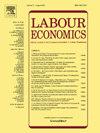Gender differences in reservation wages: New evidence for Germany
IF 2.2
2区 经济学
Q2 ECONOMICS
引用次数: 0
Abstract
Generally, women set lower reservation wages than men what may translate into substantial gender pay gaps in the labor market. This paper compares both parametric and semiparametric estimators to analyze unexplained gender gaps in reservation wages among non-employed individuals in Germany. We examine these estimators using both conventional and data-driven model specifications. The results suggest substantial unexplained gaps in favor of men (up to 8%). In addition, we show that the gaps are larger at the top of the reservation wage distribution as well as among individuals with children and with a high educational attainment. The estimates are robust across the various estimators and model specifications. These findings imply that pronounced unexplained gender gaps in reservation wages do exist in Germany. As they are likely to result in actual gender pay gaps, gender gaps in reservation wages should be on the political agenda.
保留工资的性别差异:德国的新证据
一般来说,女性设定的保留工资低于男性,这可能会导致劳动力市场出现巨大的性别薪酬差距。本文比较了参数估计法和半参数估计法,以分析德国非就业人员保留工资中无法解释的性别差距。我们使用传统模型和数据驱动模型规范对这些估计方法进行了检验。结果表明,男性的未说明差距很大(高达 8%)。此外,我们还发现,在保留工资分布的顶端以及有子女和高学历的个人中,差距更大。这些估计值在不同的估计方法和模型规范下都是稳健的。这些研究结果表明,在德国,保留工资中确实存在明显的无法解释的性别差距。由于它们很可能导致实际的性别薪酬差距,因此保留工资中的性别差距应列入政治议程。
本文章由计算机程序翻译,如有差异,请以英文原文为准。
求助全文
约1分钟内获得全文
求助全文
来源期刊

Labour Economics
ECONOMICS-
CiteScore
3.60
自引率
8.30%
发文量
142
期刊介绍:
Labour Economics is devoted to publishing research in the field of labour economics both on the microeconomic and on the macroeconomic level, in a balanced mix of theory, empirical testing and policy applications. It gives due recognition to analysis and explanation of institutional arrangements of national labour markets and the impact of these institutions on labour market outcomes.
 求助内容:
求助内容: 应助结果提醒方式:
应助结果提醒方式:


